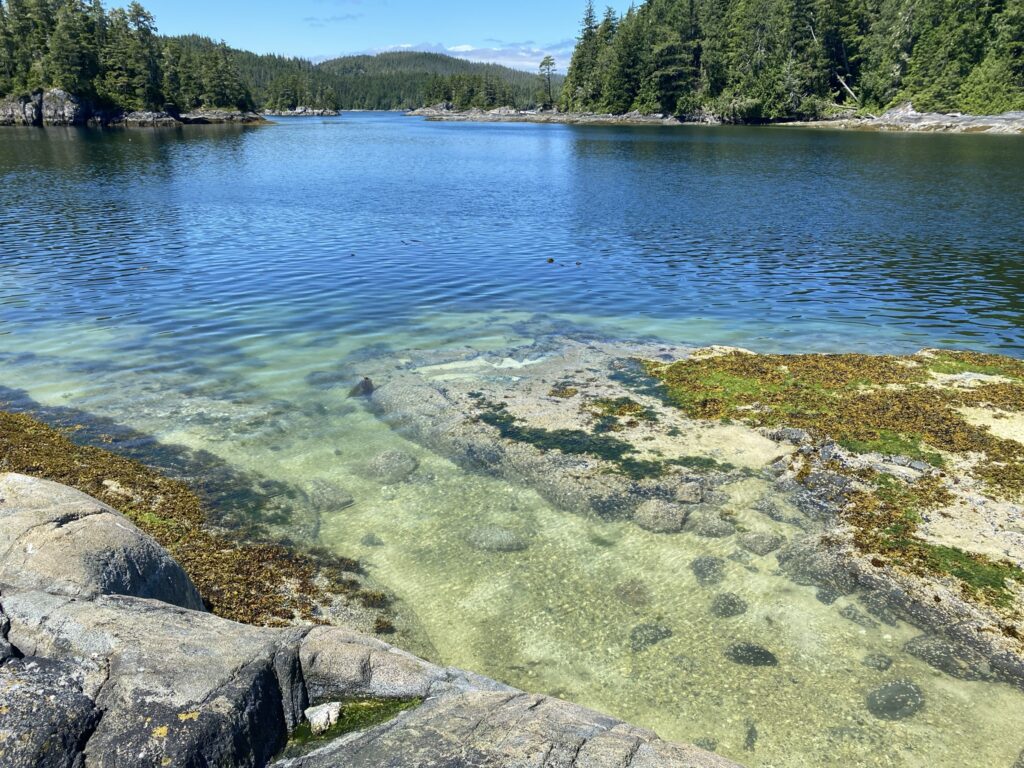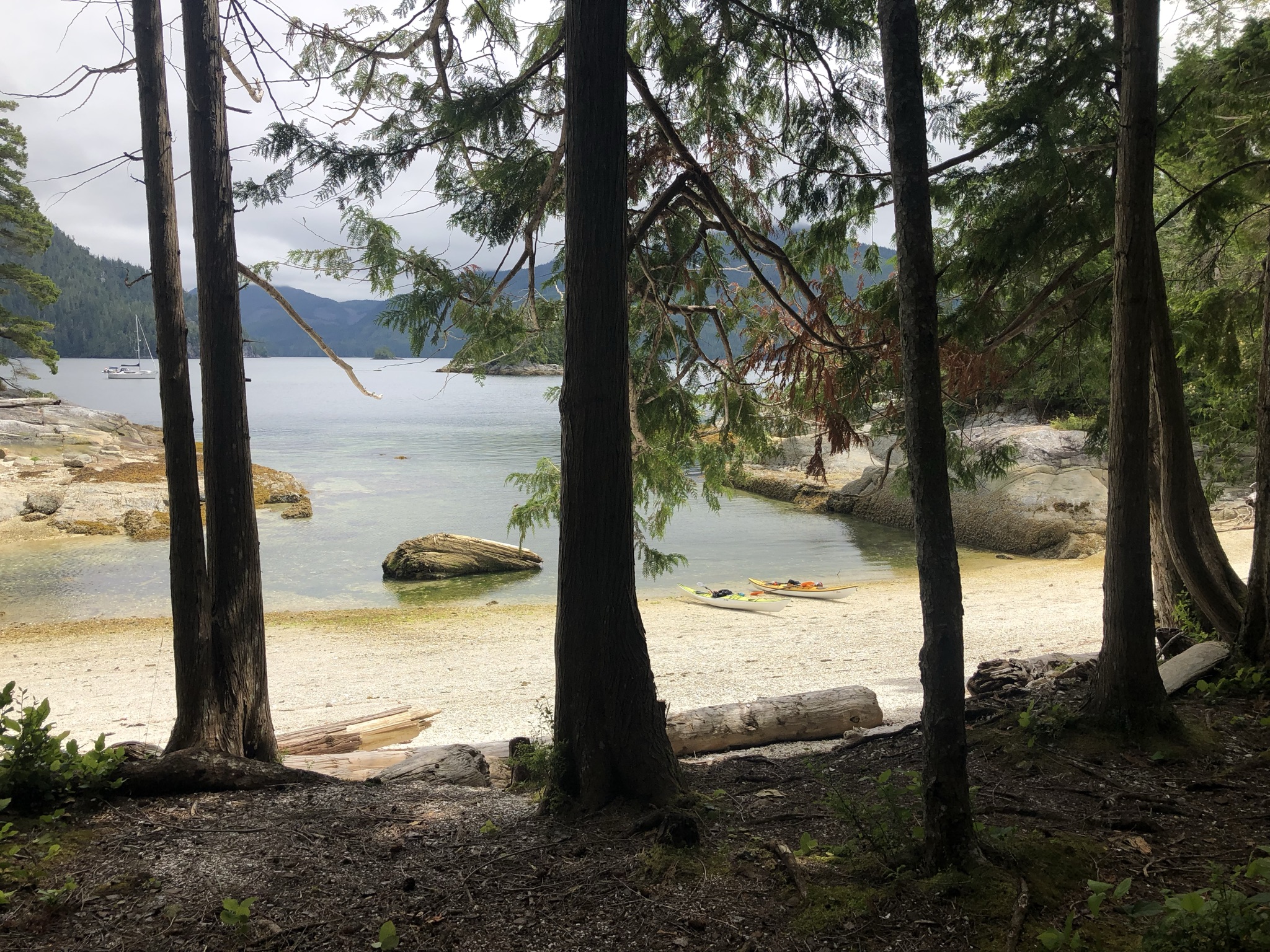This case concerns the 2023 decision by the federal Minister of Fisheries, Oceans and the Canadian Coast Guard (the “Minister”) to not renew aquaculture licences for open-net pen Atlantic salmon fish farms in the Discovery Islands of British Columbia (the “2023 Decision”). The 2023 Decision was challenged by three multinational fish farm operators—Cermaq Canada Ltd, Mowi Canada West Inc, and Grieg Seafood B.C. Ltd (collectively the “Operators”)—as well as Wei Wai Kum First Nation and We Wai Kai First Nation (collectively the “Laich-kwil-tach Nation”).

Photo credit: Krista Robertson
Kwikwasut’inuxw Haxwa’mis First Nation, ‘Namgis First Nation, St’át’imc Chiefs Council, Stó꞉lō Tribal Council, Musqueam Indian Band, and the Union of British Columbia Indian Chiefs, intervened in the case.1 A coalition of environmental organizations represented by Ecojustice Canada also intervened.
Background
In 2019, the federal Liberal Party and Prime Minister Justin Trudeau campaigned on a promise to end open-net pen fish farms in the Discovery Islands by 2025. In 2020, the former Minister announced a decision to phase out open-net pen fish farms in the Discovery Islands (the “2020 Decision”). The Operators challenged the 2020 Decision. In 2022, the Federal Court quashed the decision because the Minister did not provide sufficient reasons for the decision and did not adequately consult the Operators. The court ordered the Minister to reconsider the decision. Over the next year, a newly appointed Minister conducted additional consultations with the Operators and some affected First Nations, focussing primarily on the First Nations whose asserted territories included the Discovery Islands.

Photo credit: Krista Robertson
On February 17, 2023, the Minister announced the 2023 Decision to not reissue aquaculture licenses to the Operators. Unlike the 2020 Decision, the Minister provided an extensive record (over 5000 pages) that informed her decision. In her reasons, the Minister cited the precautionary principle and scientific evidence to justify her view that the fish farms posed unacceptable risk to wild salmon. The Minister took the view that Discovery Islands are a unique area and that there is more than a minimal risk that the fish farms are contributing to the decline of wild salmon stocks, with corresponding adverse impacts on many First Nations along the migratory route. The Minister did not follow DFO recommendation to renew all licences for a 1-year term. Instead, the Minister declined to renew any licences except a 1-year licence for one small operator that was not part of the litigation.2
Discussion
There were three issues in this case:
- Did the Minister meet the duty to consult?
- Was the 2023 Decision procedurally fair?; and
- Was the 2023 Decision reasonable?
Duty to Consult
The duty to consult exists to protect asserted and established Aboriginal rights and is rooted in the goal of reconciliation. In this case, all parties agreed that the Minister owed a duty to consult but disagreed on the extent of consultation required and whether the Minister met the duty.
Laich-kwil-tach Nation argued that the Minister owed a deep duty to consult due to potential of the licensing decisions to impact their asserted title rights. They argued the risk of non-compensable damage from a non-renewal decision was high, and the Minister was required to conduct a strength of title claim assessment. Further, they argued the Minister failed to adequately consult and grapple with their proposals to address environmental concerns.3
The court disagreed with Laich-kwil-tach Nation and found that the level of consultation owed was at the middle to low end of the spectrum. In the court’s view, Laich-kwil-tach Nation’s claim was weakened due to overlapping title claims to the Discovery Islands by other First Nations.4 The court also held that the Minister was not required to perform a strength of claim assessment as the DFO had already conceded Laich-kwil-tach Nation’s strength of claim for the purpose of the licensing decision.5 Moreover, the court held that the Minister was not required to engage with every submission made by Laich-kwil-tach Nation to maintain the honour of the Crown. Rather, in the court’s view, the Minister was obligated to ensure mid-level consultation, which the Minister met by providing notice, a sufficiently long consultation period, and direct engagement with Laich-kwil-tach Nation.6
The court acknowledged that the Minister’s decision was appropriately informed by other First Nations’ concerns about declining Fraser River wild salmon. The court recognized that the 2023 Decision had potential to affect many First Nations inside and outside of the Discovery Islands, and therefore the Minister had to consider the impacts of the licensing decision along the entire migratory route. Further, the court held that the risk of non-compensable damage for First Nations outside of the Discovery Islands was high, as declining wild salmon populations threatened their Aboriginal fishing rights.7
Procedural Fairness
The court observed that, under the Fisheries Act, the Minister has “absolute discretion” to make licensing decisions and the Act does not prescribe a rigorous process. However, the court held that license applicants are owed procedural fairness, meaning the Minister must follow certain basic procedural steps before making a licensing decision.
The court held the Operators were owed notice of the consultation process and an invitation to make submissions for the Minister’s consideration, and that the process was carried out accordingly. The court found there was insufficient evidence to show the Minister pre-judged the outcome.
Reasonableness
The Fisheries Act places few constraints on the Minister’s decision-making authority. The Minister must consider prescribed factors under sections 2.4 and 2.5 of the Fisheries Act—including potential adverse effects on Indigenous Peoples—and meet the common law standard of reasonableness. Reasonableness means a decision must be justified, intelligible, and transparent. Usually, that means the Minister’s reasons for a decision should be broadly responsive to concerns raised by the applicants.
The court found the decision was reasonable based on the facts of the case. While the DFO had recommended renewing the Operators’ licences, the court held that the Minister was reasonable in accounting for non-Canadian Science Advisory Secretariat (“CSAS”) science that considered the cumulative effects of salmon aquaculture, noting that CSAS did not consider the cumulative effects of aquaculture operations in combination with other environmental stressors. Further, the court observed that the Minister’s reasons addressed the primary issues raised by the parties, and explained her views on the science, the duty to consult, and the uniqueness of the Discovery Islands.8
Key Takeaways
This decision is a win for many BC First Nations and conservationists who have fought to protect Fraser River wild salmon for decades. The case also illustrates the difficulty of challenging licensing decisions under the Fisheries Act. Unless a decision clearly breaches the duty of procedural fairness or is obviously unreasonable, courts tend to defer to the Minister’s discretion on matters of policy and public interest. This case is a good example of when the Minister used her discretionary statutory power under the Fisheries Act to act precautionarily and to protect Aboriginal rights when making a public interest decision involving competing stakeholder interests.
This case summary provides our general comments on the case discussed and should not be relied on as legal advice. If you have any questions about this case or any similar issue, please contact any of our lawyers.
See CanLII for the Reasons for Judgement.
Footnotes
1 Mandell Pinder was counsel to this coalition of interveners.
2 That operator, known as Saltstream, operates a single fish farm raising Chinook salmon at Doctor Bay.
3 Paras 60-65.
4 Paras 77-78.
5 Para 79.
6 Para 80.
7 Paras 72-75.
8 Paras 120-121